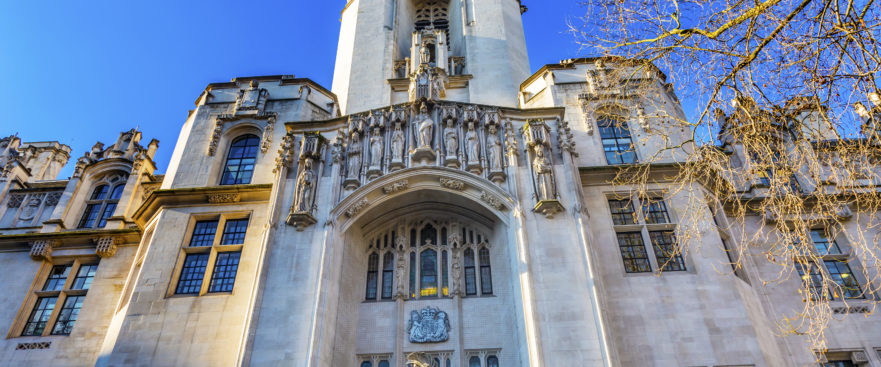
In the wake of the Supreme Court’s decision in Bloomberg v ZXC, and with the courts having to balance a criminal suspect’s right to privacy against a journalist’s right to freedom of expression, Jenny Wiltshire, Head of Serious and General Crime, makes the case for Parliament to legislate for a new ‘right to anonymity’ for criminal suspects.
++++
The Supreme Court’s decision in Bloomberg v ZXC has led to much media commentary – and legal handwringing – about the level of privacy an individual accused of a crime can expect.
There has, over the past decade, been a steady evolution of privacy law which has gradually circumscribed the media’s ability to name uncharged criminal suspects. At each step, the question of what information about a criminal suspect should be in the public domain has been hotly debated. There are strongly held opinions on both sides.
Cutting as it does the heart of the public’s faith in the institutions of government, I believe the issue of criminal suspect anonymity to be crucially important in a democracy: too important, indeed, to be left for the courts to determine alone.
It is time for Parliament to step in and legislate.
Exceptional Circumstances
Christopher Jeffries was the landlord, and neighbour, of Joanna Yeates, a 25-year-old woman murdered in Hampshire in 2010. Mr Jefferies was initially suspected of the crime. His arrest led to a deluge of lurid – and highly speculative – press coverage about him.
It didn’t take long for police to establish Mr Jefferies’ innocence. But it was already too late: such was the ferocity of the media attack that the damage to his reputation was already done.
‘The UK press set about what can only be described as a witch hunt’, Mr Jefferies later recalled in a statement to the Leveson inquiry into press ethics. ‘It was clear that the tabloid press had decided that I was guilty of Miss Yeates’ murder and seemed determined to persuade the public of my guilt.
‘They embarked on a frenzied campaign to blacken my character by publishing a series of very serious allegations about me which were completely untrue. Allegations which were a mixture of smear, innuendo and complete fiction.’
Christopher Jeffries was not the only innocent person to testify to the Leveson inquiry about the rough treatment they received, through no fault of their own, from the UK media. Lord Leveson’s eventual report, issued in 2012, was sympathetic to their plight. The former High Court judge recommended that, save in exceptional circumstances, ‘the names or identifying details of those who are arrested or suspected of a crime should not be released to the press or the public.’
A year later, in 2013, the national police training body, The College of Policing, issued its Guidance on Relationships with Media. Following Leveson, it recommended that the practice (which had until that point be relatively routine among police forces), of releasing to the media the identity of arrested people should cease.
The College of Policing stated that ‘save in clearly identified circumstances, or where legal restrictions apply, the names or identifying details of those who are arrested or suspected of a crime should not be released by police forces to the press or the public.’
It gave examples of these exceptional circumstances as being when there was a threat to life, the prevention or detection of crime or a matter of public interest and confidence.
Operations Yewtree and Midland
Then came Operations Yewtree and Midland, the two now notorious Metropolitan police investigations into allegations of historic sexual assault made against high profile people. Both operations resulted in highly publicised arrests of individuals against whom no further police action was ever taken and who were later proved to be innocent.
While the Met did not directly name the arrested men, they did release formal statements which gave sufficient details, such as age and geographical location, for the press to easily identify the suspects. These served as the confirmation the media needed to publish its stories.
Although not formally part of Yewtree (as the case was overseen by the Thames Valley and South Yorkshire forces) one of that operation’s highest profile victims was the singer Cliff Richard, whose police home search was recorded – and broadcast live – by a helicopter-borne BBC camera. Sir Cliff was later exonerated.
The Operation Midland scandal, in which the Met believed the easily disprovable lies of the fantasist Carl Beech, lead to a review of the force’s procedures in relation to historic sexual allegations.
In his review report Sir Richard Henriques recommended the Met cease its practice of issuing press releases which may lead to the identification of arrested individuals. Sir Richard also called for Parliament to act, saying:
‘Present arrangements…have caused the most dreadful unhappiness and distress to numerous suspects, their families, friends and supporters. Those consequences were avoidable by protecting anonymity. Nobody is safe from false accusation and damaging exposure under present arrangements. A reputation built on a lifetime of public service or popular entertainment can be extinguished in an instant. I sincerely believe that statutory protection of anonymity pre-charge is essential in a fair system.’
Bloomberg v ZXC
In February 2022, in the case of Bloomberg v ZXC, the Supreme Court ruled that criminal suspects have a ‘reasonable expectation of privacy’ until they are charged. This judgement led to much criticism.
Bloomberg’s editor-in-chief John Micklethwait said the decision is a ‘right to privacy is only for those who can afford it — strangely enough, these often tend to be those who have the most to hide.’
Former media minister John Whittingdale claimed: ‘The courts are apparently applying privacy laws more widely than previously done and without Parliament having properly approved’.
Parliament, however, has repeatedly declined to act on the issue of criminal suspect anonymity. In 2018, following confirmation that it would not appeal the Cliff Richard ruling, the BBC said: ‘there is a fundamental principle of press freedom at stake here and one upon which we believe that parliament, as our law makers, should decide.’
This suggestion was rejected by the then Prime Minister Theresa May. It has been left to the courts to perform the delicate balancing exercise between a suspect’s Article 8 right to privacy and a journalist’s Article 10 right to freedom of expression.
Time for Parliament to Act
In my view it is long past time for Parliament to grasp the criminal suspect anonymity nettle.
I believe it is only by stating clearly what information can and can’t be made public – and making the arguments for this in the public arena – that anonymity rules will have any democratic legitimacy. Absent this and there is a risk that public’s faith in the institutions of power, and the rule of law in general, will diminish further.
As a criminal defence solicitor who has represented – and seen first-hand the damage caused to – innocent people unjustly suspected of crime, I think that Parliament must act to provide suspects a statutory right to anonymity.
Given the previous, failed attempts to clearly define ‘exceptional circumstances’, I propose this new law includes a ‘public interest safety valve’ by which an interested party can make an emergency application to a court (in a similar way to applying for a warrant) to waive anonymity. An example of when this may be appropriate is when the police need the public’s help in finding a victim whose life was thought to be in danger.
It is only with a clear statutory framework that those suspected, but not charged, with crimes as well as the public’s reasonable and understandable interest in the detection and prevention of crime will be properly satisfied.


